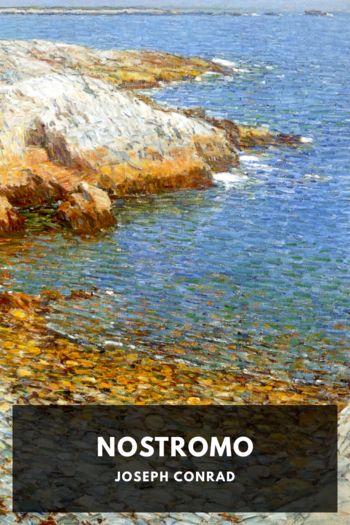Nostromo - Joseph Conrad (books to read fiction .TXT) 📗

- Author: Joseph Conrad
Book online «Nostromo - Joseph Conrad (books to read fiction .TXT) 📗». Author Joseph Conrad
And all day Captain Mitchell would talk like this to his more or less willing victim—
“The plaza. I call it magnificent. Twice the area of Trafalgar Square.”
From the very centre, in the blazing sunshine, he pointed out the buildings—
“The Intendencia, now President’s Palace—Cabildo, where the Lower Chamber of Parliament sits. You notice the new houses on that side of the plaza? Compania Anzani, a great general store, like those cooperative things at home. Old Anzani was murdered by the National Guards in front of his safe. It was even for that specific crime that the deputy Gamacho, commanding the Nationals, a bloodthirsty and savage brute, was executed publicly by garrotte upon the sentence of a court-martial ordered by Barrios. Anzani’s nephews converted the business into a company. All that side of the plaza had been burnt; used to be colonnaded before. A terrible fire, by the light of which I saw the last of the fighting, the llaneros flying, the Nationals throwing their arms down, and the miners of San Tome, all Indians from the sierra, rolling by like a torrent to the sound of pipes and cymbals, green flags flying, a wild mass of men in white ponchos and green hats, on foot, on mules, on donkeys. Such a sight, sir, will never be seen again. The miners, sir, had marched upon the town, Don Pepe leading on his black horse, and their very wives in the rear on burros, screaming encouragement, sir, and beating tambourines. I remember one of these women had a green parrot seated on her shoulder, as calm as a bird of stone. They had just saved their señor administrador; for Barrios, though he ordered the assault at once, at night, too, would have been too late. Pedrito Montero had Don Carlos led out to be shot—like his uncle many years ago—and then, as Barrios said afterwards, ‘Sulaco would not have been worth fighting for.’ Sulaco without the Concession was nothing; and there were tons and tons of dynamite distributed all over the mountain with detonators arranged, and an old priest, Father Roman, standing by to annihilate the San Tome mine at the first news of failure. Don Carlos had made up his mind not to leave it behind, and he had the right men to see to it, too.”
Thus Captain Mitchell would talk in the middle of the plaza, holding over his head a white umbrella with a green lining; but inside the cathedral, in the dim light, with a faint scent of incense floating in the cool atmosphere, and here and there a kneeling female figure, black or all white, with a veiled head, his lowered voice became solemn and impressive.
“Here,” he would say, pointing to a niche in the wall of the dusky aisle, “you see the bust of Don Jose Avellanos, ‘Patriot and Statesman,’ as the inscription says, ‘Minister to Courts of England and Spain, etc., etc., died in the woods of Los Hatos worn out with his lifelong struggle for Right and Justice at the dawn of the New Era.’ A fair likeness. Parrochetti’s work from some old photographs and a pencil sketch by Mrs. Gould. I was well acquainted with that distinguished Spanish-American of the old school, a true Hidalgo, beloved by everybody who knew him. The marble medallion in the wall, in the antique style, representing a veiled woman seated with her hands clasped loosely over her knees, commemorates that unfortunate young gentleman who sailed out with Nostromo on that fatal night, sir. See, ‘To the memory of Martin Decoud, his betrothed Antonia Avellanos.’ Frank, simple, noble. There you have that lady, sir, as she is. An exceptional woman. Those who thought she would give way to despair were mistaken, sir. She has been blamed in many quarters for not having taken the veil. It was expected of her. But Dona Antonia is not the stuff they make nuns of. Bishop Corbelan, her uncle, lives with her in the Corbelan town house. He is a fierce sort of priest, everlastingly worrying the government about the old Church lands and convents. I believe they think a lot of him in Rome. Now let us go to the Amarilla





Comments (0)